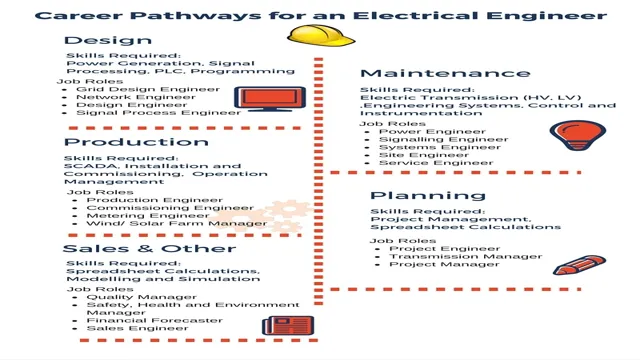Power Up Your Career: Navigating the Exciting Path of Electrical Technology
Have you ever considered a career in electrical technology? It’s a field that’s always in demand, with plenty of opportunities for growth and advancement. From installing and maintaining wiring systems to developing cutting-edge technology, the possibilities within the field of electrical technology are both varied and exciting. But where does one begin on the path to a career in electrical technology? The first step is to acquire a solid education and hands-on experience in the field.
This can include a bachelor’s degree in electrical engineering, an apprenticeship with a licensed electrician, or vocational training at a technical school. As technology continues to evolve at a breakneck pace, those who work in electrical technology must be able to adapt and learn quickly. They must also possess a keen eye for detail and a passion for problem-solving.
But for those who enjoy a stimulating, ever-changing work environment, the rewards can be immense. So whether you’re a recent high school graduate or an experienced professional looking to switch careers, there’s never been a better time to explore the exciting world of electrical technology. With a bit of hard work and dedication, the path to a fulfilling and lucrative career in this field can be within reach.
What is Electrical Technology?
Electrical technology is a field that combines electrical and electronic principles with engineering and computer technology. It involves designing, installing, maintaining, and repairing electrical systems and equipment. Electrical technology has numerous career paths, including power systems, control systems, communication systems, and electronic systems.
A career in electrical technology requires a strong foundation in mathematics, physics, and computer science. Electrical technology professionals work in a wide range of industries, including construction, manufacturing, telecommunications, and power generation. With the increasing demand for sustainable energy, electrical technology has become a crucial aspect of many industries.
Pursuing a career in electrical technology can lead to a rewarding and lucrative profession. There are various career opportunities available for individuals interested in pursuing an electrical technology career path.
Explaining the Electrical Technology Field
Electrical Technology is the field that focuses on the study and application of electrical systems and devices. It encompasses a broad range of topics that deal with electrical systems, including electronics, power generation, transmission, and distribution. Electrical technologists work with the design, implementation, and maintenance of electrical components that are used in various industries such as transportation, construction, and telecommunications.
Essentially, they ensure that electrical systems are functioning effectively and efficiently, while also troubleshooting and repairing any issues that arise. Think of them as the “mechanics” of electricity! With the increasing reliance on technology, the demand for skilled electrical technologists is on the rise – making this a lucrative and dynamic field to explore.

Skills and Qualifications Needed for Success
Electrical technology is a field that involves the study and application of electrical power, systems, and devices. It covers a wide range of topics, including electricity generation, transmission, and distribution, as well as the design and installation of electrical infrastructure. In order to succeed in this field, one needs to have a strong background in mathematics and physics, as well as a keen eye for detail and an inquisitive mind.
A good understanding of electronic circuits, computer programming, and automation is also important. Additionally, excellent communication skills, both written and verbal, are necessary for success, as electrical technicians often work in teams and must be able to explain complex concepts to non-technical personnel. To be successful in the electrical technology field, one must possess a blend of technical knowledge, problem-solving skills, and communication abilities.
Electrical Technology Career Paths
If you’re interested in electrical technology, there are several career paths to choose from. One option is to become an electrician, where you’ll work on installing and repairing electrical systems in buildings. This career can be physically demanding but also offers great job security and the opportunity to work independently or as part of a team.
Another option is to become an electrical engineer, where you’ll design and oversee the installation of electrical systems in buildings, transportation systems, and other infrastructure projects. This career requires strong problem-solving skills and knowledge of mathematics and physics, but can be highly rewarding and can lead to opportunities to work on exciting projects. Finally, you can also consider becoming an electronics technician, where you’ll work on diagnosing and repairing electronic devices and systems.
This career requires strong technical skills and the ability to work in a fast-paced environment, but can be a great choice if you enjoy hands-on work and want to work in an industry that is constantly evolving. Whatever career path you choose, there are plenty of opportunities to grow and advance in the field of electrical technology.
Electrician
As an electrician, there are a variety of career paths that you can pursue within the electrical technology field. One option is to specialize in residential electrical work, which involves installing and repairing electrical systems in homes, apartments, and other residential buildings. Another path is to focus on commercial electrical work, which involves working with larger electrical systems in office buildings, retail stores, and other commercial spaces.
You can also choose to specialize in industrial electrical work, which involves working with complex electrical systems in factories, power plants, and other industrial settings. No matter which path you choose, a career in electrical technology can provide you with a challenging, rewarding, and in-demand job with the opportunity for advancement. Whether you are interested in working with your hands, solving problems, or working in a team environment, there is a career path in electrical technology that can suit your skills and interests.
So, if you are looking for a career that offers stability, growth, and variety, consider becoming an electrician and explore the different paths available to you.
Electrical Engineer
When it comes to electrical technology career paths, there are plenty of options for electrical engineers to explore. As an electrical engineer, your expertise and skills can be applied across various industries, from energy and utilities to manufacturing and telecommunications. Whether you want to specialize in designing electrical systems for buildings, power grids, or electronic devices, there are plenty of opportunities to put your knowledge into practice.
You could work for a government agency, a private company, or a consulting firm, depending on your preferences and qualifications. With a diverse range of job opportunities and growing demand for skilled electrical engineers, you can explore exciting career paths that cater to your interests and goals. So, if you’re passionate about solving complex problems, innovating new technologies, and collaborating with other professionals, electrical engineering might be the perfect career option for you.
Electronics Technician
An electronics technician is a professional who repairs and maintains various electronic devices and systems. If you’re someone who has a passion for circuits, microprocessors, and other related stuff, then this career in electrical technology could be your dream job. This field involves dealing with a wide range of electronic devices, including computers, smartphones, audio and video equipment, and much more.
Additionally, an electronics technician may also be involved in the installation and maintenance of various electronic systems. The career path for an electronics technician can lead in many directions, including working for large corporations, small businesses, or even becoming a freelance engineer. Some may specialize in a particular area, such as audio or computer systems, while others may work in manufacturing, testing, and quality control.
With rapid advancements in technology, there is always a demand for skilled electronics technicians, making this an excellent career choice for those with a passion in electrical technology. To become an electronics technician, one would typically require a degree or certification in electronics. However, many also enter the field with experience gained through technical or vocational training.
An electronics technician should have strong analytical and problem-solving skills, good manual dexterity, and attention to detail. Overall, the career of an electronics technician is an exciting and versatile field that offers a lot of employment opportunities. Whether you’re interested in repairing electronic devices or developing new systems, there’s a high demand for skilled professionals in this field.
So if you’re passionate about electrical technology and enjoy working with your hands, then becoming an electronics technician might just be the perfect career for you.
Training and Education Opportunities
If you’re considering a career path in electrical technology, there are many training and education opportunities available to you. One great option is pursuing an associate’s degree or certificate program at a technical school or community college. These programs typically cover topics such as electrical systems, wiring, and safety, and can prepare you for entry-level positions in the field.
Additionally, you may want to consider earning additional certifications from professional organizations, such as the National Institute for Certification in Engineering Technologies (NICET), which can demonstrate your expertise and may make you more competitive in the job market. Another option is pursuing an apprenticeship with an electrical contractor or union, which can provide you with hands-on training and mentorship from experienced professionals. Whatever path you choose, keep in mind that continuing education and staying up-to-date with the latest technology and safety protocols will be critical to your success in this field.
Vocational Schools and Apprenticeships
Vocational Schools and Apprenticeships are two excellent options for individuals willing to learn a trade and get hands-on experience. Students who attend vocational schools can pursue various fields such as healthcare, construction, automotive, and culinary, among others. These schools offer a more practical and affordable alternative to traditional four-year colleges, and many of them have partnerships with local businesses, providing students with internship opportunities.
On the other hand, apprenticeships provide real-world learning experiences by working alongside experienced professionals. Apprenticeships are available in a wide range of industries and have different levels of education requirements, making them accessible to high school graduates or individuals who want to switch careers. With the right training and education, individuals can develop the skills and knowledge needed to succeed in their chosen field.
Associate Degrees and Bachelor’s Degrees in Electrical Technology
If you’re interested in pursuing a career in electrical technology, an associate degree and a bachelor’s degree are two common programs to consider. An associate degree is a two-year program that provides students with a foundational understanding of electrical systems and applications. This program covers topics such as circuit analysis, digital electronics, and electrical installation.
Additionally, an associate degree program also teaches students how to design, install, and troubleshoot electrical systems. On the other hand, a bachelor’s degree is a four-year program that covers advanced topics, such as power systems, electrical machinery, and control systems. This program is designed to provide students with a comprehensive understanding of electrical engineering principles and practices.
Students can expect to gain hands-on experience by working on projects, conducting research, and collaborating with industry professionals. Ultimately, it’s up to you to decide which program aligns with your career goals. Whether you choose an associate or a bachelor’s degree, both programs offer valuable training and education opportunities in the field of electrical technology.
Job Outlook and Salary Expectations
If you’re considering pursuing a career in electrical technology, the job outlook is optimistic in the coming years. The Bureau of Labor Statistics predicts a 10% growth rate for electrical and electronics engineering technicians from 2020 to 2030. The demand for automation and alternative energy is expected to continue driving this growth.
As for salary expectations, the median annual wage for electrical and electronics engineering technicians was $65,260 as of May 2020. However, salaries can vary depending on location, industry, and experience. For example, those who work in the computer systems design and related services industry tend to earn higher wages on average.
Overall, the electrical technology career path offers promising job opportunities and decent earning potential.
Conclusion
In conclusion, pursuing a career in electrical technology is like being a master of a magical realm where electricity is the wizardry and technology is the enchantment. With endless opportunities for innovation and problem-solving, an electrical technology career path promises to be a thrilling journey, filled with shocks and sparks of excitement. With a passion for science and a curiosity for the unknown, electrical technicians can bring to life the very fabric of modern society.
So plug-in, power-on, and charge ahead towards an electrifying career in electrical technology.”
FAQs
What are some career options in electrical technology?
There are several career paths in electrical technology such as electrical engineers, electricians, electronics technicians, power plant operators, and renewable energy specialists.
What education is required for a career in electrical technology?
A degree in electrical engineering, electronics engineering, or a related field is typically required for most electrical technology careers. Some positions may only require a vocational degree or apprenticeship program.
How much can one expect to earn in an electrical technology career?
Salaries in electrical technology vary depending on the specific job, experience, and location. However, according to the Bureau of Labor Statistics, the median annual wage for electrical engineers was $98,530 as of May 2020, while the median annual wage for electricians was $56,900.
What skills are important for success in electrical technology careers?
Strong analytical and problem-solving skills, technical knowledge, and attention to detail are important in electrical technology careers. Communication and teamwork skills, as well as the ability to remain up-to-date with new technology, are also essential.






